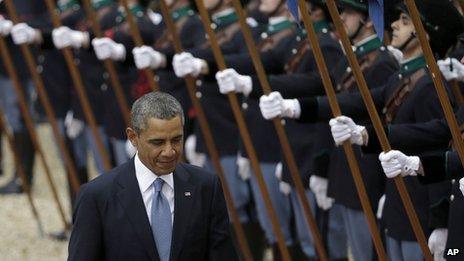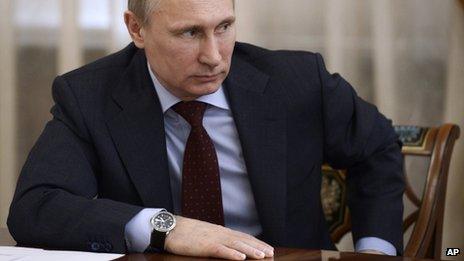Ukraine crisis: Stalin's joke sums up Obama's dilemma
- Published

US President Barack Obama met with Italian officials on a visit to the European nation this week
During his visit to the Vatican today, US President Barack Obama won't be tempted to ask Stalin's sneering question, external: "How many divisions has the Pope?"
But the Soviet dictator's joke lies at the heart of Mr Obama's Eastern dilemma.
Stalin's point was of course that the greatest moral authority in the world is still impotent in the face of the sort of power that comes from the barrel of a gun.
Mr Obama's view, expressed in his Brussels speech, external, is the diametric opposite.
His case is that the United States and Europe stand four square behind a universal longing for "elections that are free and fair; and independent judiciaries and opposition parties; civil society and uncensored information so that individuals can make their own choices".
He said that brute force could not extinguish this longing, that "there is no going back".
The 'moral arc'
All this is very typical of this president - exhorting a young audience to a moral stance, taking the long view rather than a rush to action.
One of Mr Obama's favourite quotes, external is a Martin Luther King adaptation of a 19th Century preacher - "the moral arc of history is long but it bends towards justice".
Some political leaders see it as their duty to bring in the heavy lifting equipment, put their back into heaving and tugging until that that arc shifts in the direction they desire.
Mr Obama often seems more like the chorus than the actor.
But this moment may be more about the limits on the power of the West rather than a particular president, who is simply acknowledging, external that truth.
It is a neat irony that the speech came after a summit aimed at reducing nuclear weapons in the world. For this crisis makes it quite clear why that is a strategic, as well as moral, imperative.
The rule of thumb is nuclear powers don't fight other nuclear powers - potential regional enemies mustn't get their hands on nukes.
Mr Obama made it clear that he believes the West is on the right side of history - but it is not going to war over Ukraine.
China watching
Another nuclear power, mightier than Russia, will be watching - China is very interested in how far the US will go in defence of its friends.
However, this speech also contained a stern warning to Mr Putin - "hands off the Baltics!"

Russian President Vladimir Putin has faced sanctions over recent activity in Crimea
Mr Obama made it clear that if a Nato country was attacked, article five, external - pledging a common military response - would be invoked.
That having been said, Mr Obama is asking Stalin's question of Nato - how many divisions do they have?
Both in terms of political will and fighting forces.
The US has long wanted, external Europe to spend more and do more as it is doing less and spending less. Next week the US will announce it is sending more troops and naval forces to Europe - but it wants its allies to match that.
They won't.
After the European Union's display of unity of the lowest common denominator over sanctions, none of this is very encouraging for those who believe this is a key moment for the US and the West.
But while sanctions and military hardware are dramatic, and make good headlines, solid economic help, external to Ukraine could be more important in the long run.
Obama may be proved right in time - if Mr Putin gives him time.
The trouble with the idea that the West is on the right side of history - risible to some critics on the left - is that the moments that make up history do not always allow for a long game.
And Mr Obama has few answers to, say, a challenge in Moldova, bar patience and a Whig view of history, external.